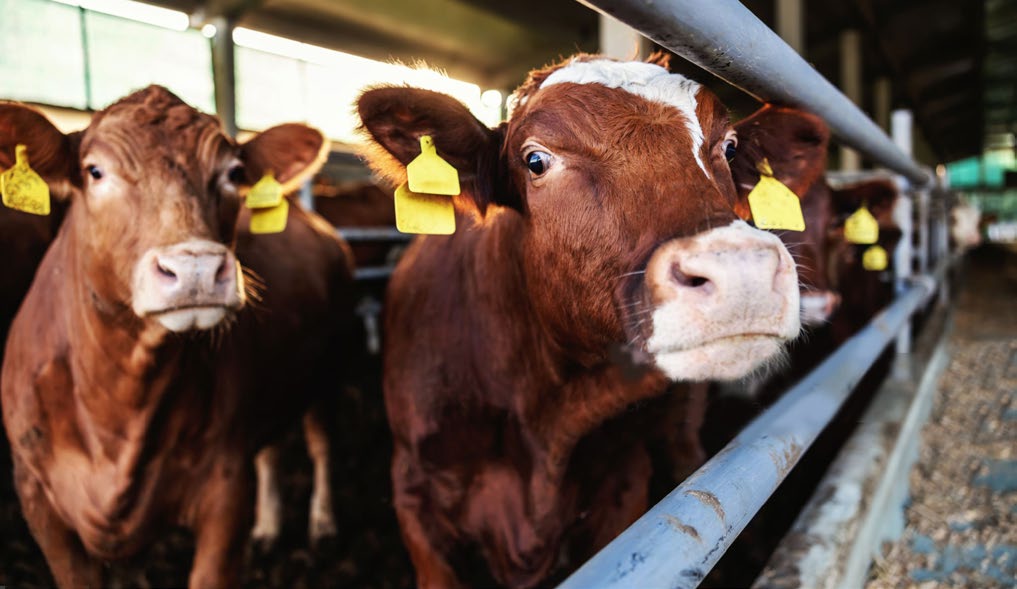Traditionally, cattle feedlots make decisions about feeding and harvesting animals using visual inspections. Getting them to trust a more scientific approach can take some convincing.
“They’re typically very confident in what they’re currently doing,” says Leigh Marquess, president of Quantum Genetix. “So, we ask them to try our system and let the technology demonstrate for itself.” Using Quantum’s system, feedlots can realize anywhere from $20 to $50 more per animal.
Quantum Genetix is a Saskatoon-based biotechnology company that uses genetics to improve efficiency and increase profit in the agricultural sector. The company is perhaps best known for its livestock testing system used in feedlots.
Quantum’s Q-Sort is a genomics-based system designed to improve feeding efficiency and help feedlots maximize their market potential. “We identify and commercialize genetic factors that affect how animals eat and grow, and we combine that knowledge with a proprietary system that allows feedlots to sort animals into groups and better predict when animals should be harvested to make the most profit,” explains Marquess.
Feedlots use Quantum’s tissue collection test when the animals arrive. The DNA results are used to sort and track the animals’ development. “The animals grow together in pens for three or four months. At that time, we take the genetic information we’ve collected and add it to other data and use that to sort the animals into groups based on how we think they’ll grow,” says Marquess.
The next step is a product called Q-Reveal, a software tool that uses genetic information to help feedlots optimize their selling decisions. “Information about all of the pens goes into the system, along with genetic information,” Marquess explains. The system then connects that with other information, like how much the animals eat and how much they weigh. The results help feedlots determine the right time to harvest to get all the potential profit out of the animals.
Quantum Genetix was launched in 2003, but only began commercializing its products three years ago. “In the field of animal genomics, researchers believed that if they could identify differences in the animals, customers would understand how to use that knowledge to create value. That’s not the case,” Marquess says. “You need to give them a fully developed product that they can plug in and see the value. It’s been a long, hard-learned lesson.”
In 2009, Quantum diversified into crop testing. While most of their feedlot clients are in the United States, the company is ideally located to reach crop producers closer to home.
Their Q-Protect kits are an easy, scientific way for a farmer to know what’s going on in their field before they make an expensive investment in disease mitigation. The kits come with packages of test tubes for collecting samples. Farmers send the samples to Quantum and get DNA diagnostics back within 24 hours.
“First, we answer the question of ‘do you have disease?’ Next, we say how much disease there is. And then we have a calculator that allows them to put in their estimated yield and the price of the fungicide so that they can determine whether they should spray,” explains Marquess.
More recently, Marquess started a new company called Relica to explore the use of plants to make oral vaccines for cattle. He explains that about 70 per cent of cattle are given daily antibiotics to prevent liver abscesses, which are common in cattle that are fed grain for an extended period. “There’s a lot of pressure to reduce antibiotic use,” he says. “So, if we could eliminate them and still address the liver issues, that would be helpful.”
He came up with the notion of getting plants to make edible vaccines. “Cattle would get the vaccine simply by eating their daily rations, and it could potentially eliminate the antibiotics.” Five years later, they have plants growing that are making the vaccines and the company is about to start animal trials to evaluate the immune response.
Innovations like these are only possible when you can hire the right people. “One of the positive things about being located in Saskatchewan is the access to trained labour here,” says Marquess. “We’ve hired everything from lab technicians to PhDs, trained here in the province.”
Local connections have been vital to Quantum’s success, and Marquess says Ag-West Bio is a good way to network and connect with other organizations. “We’ve been a member since the inception of our company, and they’ve continued to be a good resource as we grow,” he says. “If they don’t have an answer to a question, they can certainly point us in the direction we need to go. They’re a very positive resource for the biotech community.”
Photo: istock
This article first appeared in Ag-West Bio’s 2024 Annual Report.
Michelle Boulton is a Saskatoon-based freelance writer.
Previous Article – Three Farmers: Bridging the gap between producers and consumers
Next Article – Canadian Food Focus videos help share farmers’ stories with consumers
